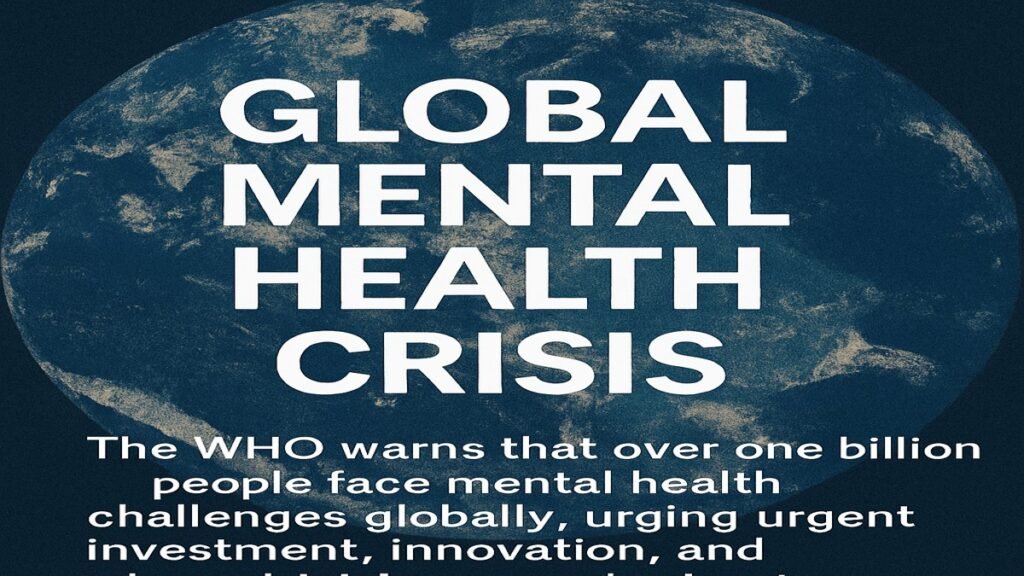Mental health has emerged as one of the most pressing public health challenges of our time. According to the World Health Organisation (WHO), more than one billion people worldwide are currently living with mental health conditions, ranging from anxiety and depression to severe psychiatric disorders. The alarming figure, revealed in the WHO’s latest report, underscores the urgent need for governments, health institutions, and communities to scale up services, funding, and global cooperation to address the crisis.
The report highlights how mental health, often overlooked in public health policies, now demands equal attention as other critical diseases such as cancer, diabetes, and heart disease. Mental well-being is not only a personal matter—it directly impacts economic productivity, social harmony, and the overall stability of societies. Without swift action, WHO warns, the world could see a significant escalation of mental health–related suffering and socioeconomic losses in the coming years.
Behind the stark statistics are real human stories. From urban centers to rural communities, people across cultures and continents are experiencing rising stress, burnout, and emotional distress. The global pandemic accelerated this trend, intensifying loneliness, unemployment, and uncertainty. Post-pandemic, geopolitical conflicts, climate anxieties, and the pressures of modern digital life have only deepened the crisis.
Recent studies show that young people are disproportionately affected. A survey cited by Axios revealed that nearly half of young adults report persistent loneliness, family struggles, and a lack of supportive resources. Mental health experts warn that without proper interventions, an entire generation could face lifelong consequences of untreated psychological distress.
Older populations, while less vocal, are also battling challenges such as dementia, depression linked to isolation, and a lack of accessible mental health services. Meanwhile, middle-aged working professionals find themselves struggling with stress related to job insecurity, long working hours, and the blurred boundaries of work-life balance in the digital era.
Mental health is not only a human rights issue—it is also an economic one. WHO estimates that depression and anxiety disorders alone cost the global economy over $1 trillion each year due to lost productivity. Employees struggling with untreated conditions are more likely to miss workdays, face burnout, and perform below potential.
In regions where mental health support is underfunded, the problem compounds. The gap between the number of people needing help and those actually receiving treatment remains vast. In low- and middle-income countries, nearly 80% of individuals with mental health conditions go untreated. This lack of care perpetuates cycles of poverty, unemployment, and worsening health outcomes.
As the crisis deepens, technology has emerged as both a challenge and a potential solution. On one hand, constant connectivity, social media pressures, and online harassment have been directly linked to rising anxiety levels, especially among youth. On the other hand, digital platforms have opened new pathways for affordable and accessible mental health care.
The Mental Health Technology Market Report 2025–2030 highlights the rise of leading platforms such as BetterHelp, Headspace, Calm, Talkspace, and Lyra Health. These services provide online counselling, meditation apps, and teletherapy that have reached millions globally. By reducing stigma and offering privacy, digital solutions are making therapy more approachable for individuals who might otherwise hesitate to seek help.
However, experts caution that technology alone cannot solve the crisis. Digital health platforms must be integrated into broader healthcare systems, supported by professional oversight, and regulated to ensure quality and patient safety.
WHO’s recent appeal emphasises that mental health must be prioritised at the same level as physical health. The organisation urges countries to increase funding, train more mental health professionals, and integrate services into primary healthcare systems.
“Mental health is no longer a silent epidemic—it is a global emergency,” said a WHO spokesperson. “We must act with urgency to ensure that everyone, everywhere, has access to affordable, quality mental health care.”
Some progress has been made. Countries such as Canada, the UK, and Australia have launched nationwide mental health strategies, increasing investment in counselling services and awareness campaigns. In the U.S., public-private collaborations are driving funding for youth-focused programs. Globally, organisations like One Mind have raised millions—recently securing $4.1 million at its 31st Music Festival—to support research and solutions.
Still, WHO stresses that these efforts need to be scaled massively and extended to low-resource nations where the majority of untreated cases remain.
While international policies and technology are crucial, experts agree that true change must begin within communities. Cultural stigma around mental illness continues to deter individuals from seeking help. In many societies, discussing depression or anxiety is still considered taboo, leaving sufferers isolated.
Grassroots initiatives are showing promise. From local peer-support groups in Africa to youth-driven advocacy in Asia, communities are working to normalise conversations about mental health. Schools are increasingly embedding mindfulness, counselling, and resilience training into their curriculums, while workplaces are adopting wellness policies that address burnout and work-related stress.
Religion and traditional practices also play a role. In some regions, spiritual counselling and community rituals provide comfort and belonging. Experts recommend blending modern psychological support with cultural sensitivities to make care more inclusive and effective.
The mental health crisis is no longer confined to academic debates or small advocacy circles. It is a lived reality for more than one billion people around the world. Yet, amid the challenges lies an opportunity: to transform how societies view and treat mental well-being.
Governments must increase investment, businesses must prioritise employee well-being, and communities must break the stigma. Technology should be harnessed as an enabler, not a replacement, for human-centred care. International organisations must continue to drive cooperation, research, and equitable access.
Mental health is a cornerstone of human development. Without addressing it, sustainable growth, social harmony, and even peace remain out of reach. The WHO’s call is clear: the time to act is now.

